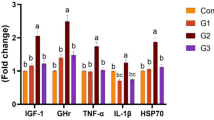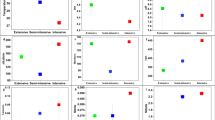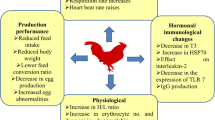Abstract
The present study was undertaken to assess the ameliorative effect of dietary supplementation of astaxanthin in Sirohi goats under simulated heat stress conditions. Eighteen healthy female Sirohi goats were divided equally into three groups (n = 6): Heat-Stressed Control (HSC), Treatment 1 (T1), and Treatment 2 (T2). During the experiment, goats in the T1 group were supplemented with astaxanthin at the rate of 25 mg/animal/day, while those in the T2 group received supplementation of 50 mg/animal/day. The experiment was conducted for 42 days: 14 days of acclimatization period, next 21 days animals were exposed to 42ºC for 6 h from 09:00 h to 15:00 h and 7 days of recovery period. On a daily basis, we recorded the physiological responses of goats and collected environmental data at the experimental site. Blood samples were collected 0 and 14th days of acclimatization, on 1st, 6th, 11th, 16th and 21st day of heat exposure and on the 7th day of the recovery period. The rectal temperature and respiration rates of the treatment groups were lower than those of the HSC group during the exposure period. Heat stress in the supplemented groups was associated with reduced levels of hepatic enzymes such as AST and ALT. Serum urea, creatinine and albumin levels were significantly (P < 0.05) different between control and treatment groups. It was thus concluded that dietary inclusion of antioxidant astaxanthin can ameliorate induced thermal load as evident from changes in physio-biochemical parameters in the Sirohi goats, that was more prominent at 50 mg/ animal/day than 25 mg/ animal/day.



Similar content being viewed by others
Data availability
The data will be made available and shared upon reasonable request.
Abbreviations
- HS:
-
Heat Stress
- HSC:
-
Heat-Stressed Control
- T1:
-
Treatment 1
- T2:
-
Treatment 2
- RT:
-
Rectal temperature
- RR:
-
Respiration rate
- ROS:
-
Reactive Oxygen Species
- NF-κB:
-
Nuclear factor kappa B
- NEFA:
-
Nonesterified fatty acids
- RH:
-
Relative Humidity
- THI:
-
Temperature-Humidity Index
- AST:
-
Aspartate aminotransferase
- ALT:
-
Alanine aminotransferase
- TP:
-
Total Protein
- ANOVA:
-
Analysis of Variance
References
Aboul-Naga AM, Elshafie MH, Khalifa H, Osman M, Khalek TA, El-Beltagi AR, Abdel-Aal ES, Abdel-Sabour T, Rekik M, Rouatbi M, Rischowesky B (2021) Tolerance capability of desert sheep and goats to exercise heat stress under hot dry conditions, and its correlation with their production performance. Small Rumin Res 205:106550. https://doi.org/10.1016/j.smallrumres.2021.106550
Aleena J, Sejian V, Bagath M, Krishnan G, Beena V, Bhatta R (2018) Resilience of three indigenous goat breeds to heat stress based on phenotypic traits and PBMC HSP70 expression. Int J Biometeorol 62:1995–2005. https://doi.org/10.1007/s00484-018-1604-5
Ambati RR, Siew Moi P, Ravi S, Aswathanarayana RG (2014) Astaxanthin: Sources, extraction, stability, biological activities and its commercial applications—A review. Mar Drugs 12(1):128–152. https://www.mdpi.com/2311-5637/8/10/484
Attia NES (2016) Physiological, hematological and biochemical alterations in heat stressed goats. B V M J 31(2):56–62. https://journals.ekb.eg/article_31261_08a8b193a78920fd83c6eb0dabee79dd.pdf
Belhadj Slimen I, Najar T, Ghram A, Abdrrabba MJ (2016) Heat stress effects on livestock: molecular, cellular and metabolic aspects, a review. J Anim Physiol Anim Nutr 100(3):401–412. https://onlinelibrary.wiley.com/doi/abs/https://doi.org/10.1111/jpn.12379
Berman A (2005) Estimates of heat stress relief needs for Holstein dairy cows. J Anim Sci 83(6):1377–1384. https://academic.oup.com/jas/article-abstract/83/6/1377/4803167
DAHD (2019) Provisional key results of 20th livestock census. Department of Animal Husbandry and Dairying, Ministry of Fisheries. Animal Husbandry & Dairying. http://dahd.nic.in/division/provisionalkey-results-20th-livestock-census Government of India
Das R, Sailo L, Verma N, Bharti P, Saikia J, Imtiwati KR, Kumar R (2016) Impact of heat stress on health and performance of dairy animals: a review. Vet World 9(3):260–268. https://doi.org/10.14202/vetworld.2016.260-268
Fuquay JW (1981) Heat stress as it affects animal production. J Anim Sci 52(1):164–174. https://academic.oup.com/jas/article-abstract/52/1/164/4658243
Helal A, Hashem AL, Abdel-Fattah MS, El-Shaer HM (2010) Effect of heat stress on coat characteristics and physiological responses of Balady and Damascus goats in Sinai, Egypt. Am Eurasian J Agric Environ Sci 7:60–69. https://www.cabdirect.org/cabdirect/abstract/20103107218
Indu S, Sejian V, Naqvi SM (2014) Impact of simulated heat stress on growth, physiological adaptability, blood metabolites and endocrine responses in Malpura ewes under semiarid tropical environment. Anim Prod Sci 55(6):766–776. https://doi.org/10.1071/AN14085
IPCC (2014) Change IP. Ipcc. Climate change http://www.ipcc.ch/
Islam MA, Al Mamun MA, Faruk M, Islam MT, Rahman MM, Alam MN, Rahman AT, Reza HM, Alam MA (2017) Astaxanthin ameliorates hepatic damage and oxidative stress in carbon tetrachloride-administered rats. Pharmacogn Res (Suppl 1):S84. https://www.ncbi.nlm.nih.gov/pmc/articles/PMC5757332/
Jadhav SN, Nayyar S, Honparkhe M, Singla M (2022) Effect of Mucuna Pruriens seeds supplementation on physiological, Hemato-Biochemical, antioxidant, thyroid, and Progesterone Profile of Beetal does in relation to Seasonal stress. Res Sq. https://doi.org/10.21203/rs.3.rs-1237399/v1
Kumar S, Singh SV (2020) Influence of astaxanthin supplementation on attainment of puberty and lipid peroxidation in Sahiwal and Karan fries (Holstein× tharparkar) heifers during summer season. Biol Rhythm Res 51(1):15–28. https://doi.org/10.1080/09291016.2018.1512298
Mader TL, Davis MS, Brown-Brandl T (2006) Environmental factors influencing heat stress in feedlot cattle. J Anim Sci 84(3):712–719. https://academic.oup.com/jas/article-abstract/84/3/712/4778579
McManus CM, Lucci CM, Maranhão AQ, Pimentel D, Pimentel F, Paiva SR (2022) Response to heat stress for small ruminants: physiological and genetic aspects. Livest Sci 105028. https://doi.org/10.1016/j.livsci.2022.105028
Rathwa SD, Vasava AA, Pathan MM, Madhira SP, Patel YG, Pande AM (2017) Effect of season on physiological, biochemical, hormonal, and oxidative stress parameters of indigenous sheep. Vet World 10(6):650. https://doi.org/10.14202%2Fvetworld.2017.650-654
Samad HA, Konyak YY, Latheef SK, Kumar A, Khan IA, Verma V, Chouhan VS, Verma MR, Maurya VP, Kumar P, Sarkar M (2019) Alpha lipoic acid supplementation ameliorates the wrath of simulated tropical heat and humidity stress in male Murrah buffaloes. Int J Biometeorol 63(10):1331–1346. https://doi.org/10.1007/s00484-019-01750-w
Sejian V, Bhatta R, Gaughan JB, Dunshea FR, Lacetera N (2018) Adaptation of animals to heat stress. Animal (s2):431 – 44. https://doi.org/10.1017/S1751731118001945
Singh SV, Somagond YM, Deshpande A (2021) Astaxanthin–king of antioxidants as immune modulator and anti-inflammatory for enhancing productive performance and health of animals. Indian J Dairy Sci 74(1):1–7. https://doi.org/10.33785/IJDS.2021.v74i01.001
Somagond YM, Singh SV, Deshpande A (2022) Effect of dietary supplementation of astaxanthin, prill fat and combination on stress indicators, milk yield and composition during heat stress in buffaloes. Biol Rhythm Res 53(5):665–675. https://doi.org/10.1080/09291016.2019.1658426
Teama FE, El-Tarabany AA (2016) Physiological and biochemical response to Omega-3 plus as a dietary supplement to growing goats under hot summer conditions. Rev Bras Zootec 45:174–180. https://doi.org/10.1590/S1806-92902016000400005
Yan W, Qiao Y, He J, Qu J, Liu Y, Zhang Q, Wang X (2022) Molecular mechanism based on histopathology, antioxidant system and transcriptomic profiles in heat stress response in the gills of Japanese flounder. Int J Mol Sci (6):3286. https://www.mdpi.com/1422-0067/23/6/3286
Yeh PT, Huang HW, Yang CM, Yang WS, Yang CH (2016) Astaxanthin inhibits expression of retinal oxidative stress and inflammatory mediators in streptozotocin-induced diabetic rats. PLoS ONE 11(1):e0146438. https://doi.org/10.1371/journal.pone.0146438
Acknowledgements
We thank the support received from the National Initiative on Climate Resilient Agriculture (NICRA) and Indian Council of Agricultural Research (ICAR) is gratefully acknowledged.
Funding
The funds were provided under the NICRA project; award number: F.No.- BUD/REL/NICRA/2013 − 141 Recipient: Gyanendra Singh, Ph. D.
Author information
Authors and Affiliations
Contributions
All authors contributed to the study conception and design. VPM conceived and designed the study. GS and VSC provided all the resources. Sample collection and processing, data collection and analysis were performed by PMK, K K, LS and V. V. The first draft of the manuscript was written by P M. K. HAS, A, G V K and LK reviewed and commented on previous versions of the manuscript. All authors read, discussed the results and approved the final manuscript for publication.
Corresponding author
Ethics declarations
Ethics approval
The experimental study and animals were approved by the institutional animal ethics committee (IAEC) of ICAR-Indian Veterinary Research Institute (IVRI), Izatnagar, UP, India. Protocol number:IAEC/26.07.2021/L13. The animals acquired, experiment conducted, maintained and rehabilitated as performa ‘D’ of CPCSEA.
Conflict of interest
The authors declare that they have no conflicts of interest.
Additional information
Publisher’s Note
Springer Nature remains neutral with regard to jurisdictional claims in published maps and institutional affiliations.
Rights and permissions
Springer Nature or its licensor (e.g. a society or other partner) holds exclusive rights to this article under a publishing agreement with the author(s) or other rightsholder(s); author self-archiving of the accepted manuscript version of this article is solely governed by the terms of such publishing agreement and applicable law.
About this article
Cite this article
Kittur, P.M., Karthiga, K., Sarma, L. et al. Astaxanthin supplementation ameliorates simulated heat stress by regulating physio-biochemical responses in Sirohi goats. Vet Res Commun (2024). https://doi.org/10.1007/s11259-024-10327-x
Received:
Accepted:
Published:
DOI: https://doi.org/10.1007/s11259-024-10327-x




